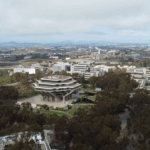Al Jazeera Makes an Appearance at the MLA
Haidar Eid, an associate professor at al-Aqsa University in the Gaza Strip, who also has a blog with Al Jazeera, pre-recorded his remarks to the Modern Language Association (MLA) convention in Vancouver, Canada.
Eid apologized for not being able to attend the convention:“Unfortunately, I have not been able to leave Gaza” for at least eight conferences. He even remarked that he “had to think twice about participating in your extremely important panel” at the MLA, which had less than a dozen people in the audience. He then blasted Israel, claiming that “Gaza has been under a medieval siege by apartheid Israel since 2007.”
The Palestinian leadership did not escape his ire. He was unhappy for the leadership caving into the “Post-Oslo map of Palestine” that exists today, even when the leadership “boasts of having laid a foundation” for an independent state. He said there are two options for Palestinians after “Zionism’s continued presence in Palestine” of becoming “assimilated or enslaved.” Referring back to the Oslo Accord, Eid said, “The granting of semi-autonomous rule over the most crowded Palestinian cities” has not amounted to much, and the Accord “never sold the antithesis that Israel has created” of “exploitation and repression.”
Ignoring past suicide bombings and both intifadas against Israel, Eid boasted of the “legacy of civil and political resistance that has become a trademark of the Palestinian struggle” and “resisting the Israeli war machine.” His goal for the panel was to “present the beginning of the deep Oslo-izing of the Palestinian mind” as a result of the Oslo Accord and to “represent an outcry to the Egyptian[s].” He noted about “75-80% of [people in] Gaza are refugees” and have been “left on their own” by the world” because of the “infamous handshake on the White House lawn [in the Clinton years].” That handshake has left the dream of a Palestinian state “far from realization.”
He reminded the audience that the Oslo Accord did not answer “the embarrassing question of the remaining 2/3 [of Palestinians]…mainly the disposed refugees living in miserable camps” and the world would like to “forget about the 6-7 million refugees scattered around the world.” Eid said, “Palestinians are not only those that live in the Gaza strip.” Going back to the 1948 agreement that formed a Jewish state, Israel then “disposed 800,000 Palestinians” and kicked them out of their ancestral lands. Israel, by now, “should acknowledge the right of Palestinians as people” and “the right of self-determination” and admit “there is no Israeli nationality.” He said this refusal to acknowledge a nationality only “encourages discrimination, gives second-class” status to non-Jews, which reaches the “inevitable conclusion” that a Palestinian state is “unattainable.”
Eid added, Palestinians should try to implement the “idea of a secular democratic state,” where a country is “inhabited by its citizens and governed on the basis of parity and equality,” have “equal footing,” and “where all citizens are treated equally, this is a rightful solution that will bring an end to the conflict.” Today, Israel “is not the state of citizens, but the state of the Jews entitled to the entire land of Israel…that still has not declared its boundaries.”
The world should change its views, “instead of blaming the victim for the mere fact of being victims,” Eid said, and suggested a push for “justice, non-discrimination and equality. And these are qualities that Israel denies Palestinians.”





